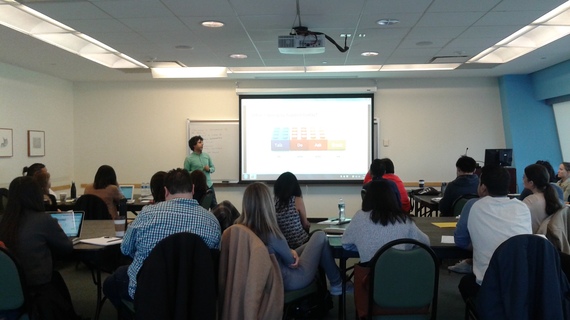
In March, Cozi Namer, Client Program Manager at Google and alumnus of the Zicklin School of Business, returned to his alma mater to teach graduate students how to succeed in their career by failing fast and failing forward. Cozi stressed that while we see curated versions of successful professionals on LinkedIn, they've all encountered failures to get where they are.
Drawing on his own experiences, he shared with students how he had failed in every job he's held, including making a costly pricing error early in his career. This mistake, he said, has made him really good at double checking his work.
That's the crux of failing fast and failing forward -- becoming better because of your mistakes, not in spite of them. Cozi also made it clear that failing often is not the same as failing fast and failing forward. If you're consistently failing at the same thing, you're not growing. The point is to learn from your errors rather than expend a lot of effort trying to defend them and cover them up.
Below are seven big ideas from Cozi's workshop.
1-Develop a growth mindset. That way you're always learning from your failures and evolving. Babies are great at this because the norms of success and failure have not yet been imposed upon them. Unlike adults who spend a lot of time planning to avoid failure, babies prototype through experimentation. This leads to constant improvement.
2-Remove absolute failure as an option. Due to myopia, our tendency is to knock ideas down before ever giving them a chance. Cozi challenged students to come up with all the positive outcomes that could result if passengers were allowed to occupy seats on airplane wings. Answers ranged from not having to deal with crying babies to being able to pee without joining a line. While the idea itself is absurd, the point of the exercise is to shift perspective by removing the conditions of why it wouldn't work. A practical application of this would be to look for all the evidence why you'd be a great candidate for a job you want without introducing any limitations. That way, you can better sell yourself.
3-Become a growth hacker. Create a win-win situation no matter what. Whether or not you get the results you want, put in place measures to keep growing and moving towards your goals. Cozi recommends optimizing your resume for your audience, while ensuring it reflects who you are. Conduct A/B testing by creating multiple versions of your resume, sending them out, and adjusting based on the response. Seek feedback from mentors and target employers so that you're getting closer to where you want to be. As Einstein said, insanity is doing the same thing repeatedly and expecting a different result. Aim for continuous improvement.
4-Be flexible. Be honest about the boundaries you've created for yourself and take steps to expand your reality. Cozi showed a video of how the Beatles were able to evolve their music over the course of the band's life by letting go of old ways of thinking and being open to new possibilities. Are there industries or locations you're not exploring in your career because of beliefs you've adopted about what's possible? By remaining in your comfort zone, you stifle your growth.
5-Create a quality experience for your users, including recruiters and those in your network. Don't treat relationships as transactions, where your only goal is to get something. This is a big turnoff because people can sense when they're a means to an end. Instead, cultivate relationships by staying in touch, keeping your promises, and taking responsibility for your actions. Admit when you've dropped the ball and offer a genuine apology. Others will respect and remember you if you admit your errors rather than try to hide them. Integrity and accountability are key to successful and meaningful relationships.
6-Be mindful. Empty your mind and be in the moment. From a career perspective, this is critical for networking conversations, interviews, and business meetings. We tend to be so focused on presenting ourselves in a certain manner and keeping up appearances that we end up providing canned and rehearsed responses without listening, missing opportunities for genuine connection. An interview, for example, is a conversation between two human beings. There's no need to put on a show -- only authenticity and honesty are required. When asked what's the best way to stand out, Cozi says be yourself.
7-Manage yourself by staying focused and motivated. When it comes to your career, there's a lot you can do. By trying doing it all, however, it will be hard to keep up and will only result in frustration. This is why many people start strong in their pursuits and give up halfway. Be clear about your goals and pick only a few priorities to focus on at a time. Small steps in the right direction lead to big results. Cozi shared how he rewarded himself with a movie for every ten rejections when he was applying for jobs right after his MBA. Rejections meant he was taking action. Considering he applied for over 800 jobs, staying motivated was key.
While failing can seem daunting because of the conditions we've placed on ourselves and the self-imposed meanings we've assigned to failure, it doesn't need to be that way. As Cozi pointed out throughout the workshop, perspective is key. By embracing failure as a way to grow and setting yourself up to win no matter what, you pave the way for your success.
Fail fast, fail forward.
Tanuja Ramchal coaches graduate students at the Zicklin School of Business to achieve career success by helping them develop an authentic brand. Having transitioned from a decade-long career in financial services where she held various leadership roles, Tanuja also works with exceptional individuals to create more freedom, fun, and fulfillment in their life and work. Click here to get her free guide to help you do the same.
Follow Tanuja on Twitter: www.twitter.com/tramchal
